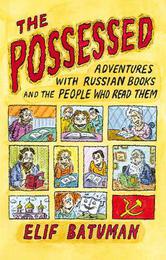
|
The Possessed: Adventures with Russian Books and the People Who Read Them
Paperback / softback
Main Details
| Title |
The Possessed: Adventures with Russian Books and the People Who Read Them
|
| Authors and Contributors |
By (author) Elif Batuman
|
| Physical Properties |
| Format:Paperback / softback | | Pages:304 | | Dimensions(mm): Height 210,Width 138 |
|
| Category/Genre | Memoirs
Modern and contemporary fiction (post c 1945) |
|---|
| ISBN/Barcode |
9781921656644
|
| Classifications | Dewey:891.709 |
|---|
| Audience | |
|---|
|
Publishing Details |
| Publisher |
Text Publishing
|
| Imprint |
The Text Publishing Company
|
| Publication Date |
27 April 2010 |
| Publication Country |
Australia
|
Description
The Possessed draws on Elif Batuman's articles in the New Yorker, Harper's Magazine, and n+1 to tell the true story of one woman's intellectual and sentimental education and her many strange encounters with scholars devoted to classic Russian writers. In a series of intertwined essays about her life - and other people's lives - in the world of Russian literature and scholarship, Batuman has written a funny, smart and self-deprecating book about Dostoyevsky, Tolstoy and Chekhov and the academics who worship them. It is full of stories of ice palaces and giant apes, conference disasters and excursions into Uzbek poetry; but there is also wisdom, and deep appreciation of the great Russian novels. Elif Batuman is a true original.
Author Biography
Authors Bio, not available
Reviews'Hilarious and remarkable...Rich in historic detail about Russian authors and literature and thoughtfully constructed, each essay is an amalgam of critical analysis, cultural criticism, and serious contemplation of big ideas like that of identity, intellectual legacy, and authorship.' * Literary Hub * 'In this delectable collection of essays, [Batuman] describes her travels to such perplexing locales as Tolstoy's former estate, Uzbekistan, a monastery on an Adriatic island, and graduate school. Hers is a lifelong quest for the grandiose, the melancholic, and-crucially-the absurd.' * Slate *
|